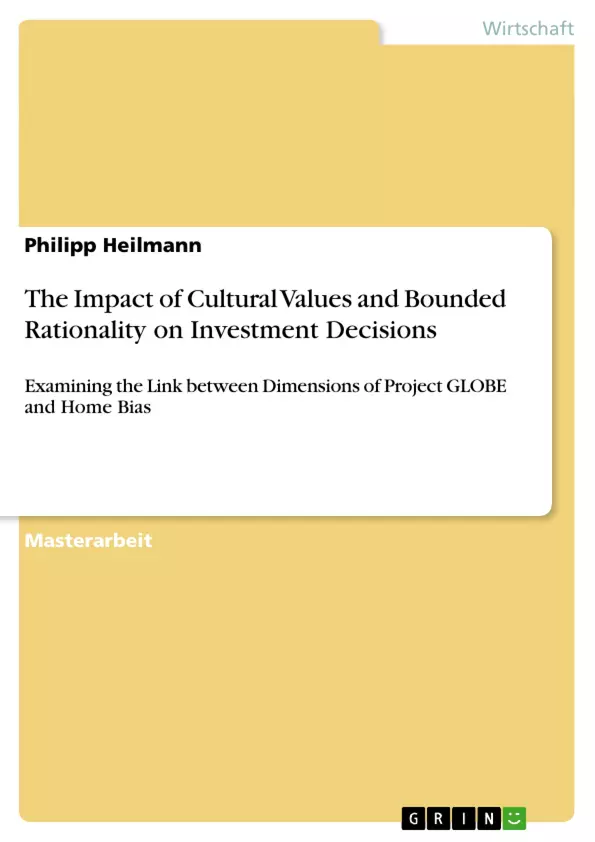This thesis investigates cultural and cognitive behavioural determinants of Home Bias through
individual and macro level regressions. Cultural dimensions of Project GLOBE provide the basis
for the development of a relational model and the hypotheses. Through theorising this link, this
thesis shows that culture has an influence specifically on investment choices, but in a wider
sense on all economic choices humans undertake. The knowledge of those influences helps
business managers in conducting international business by analysing local demand more
accurately and gaining competitive advantages through knowledge. Although research has been
conducted in this field, no approach on culture and Home Bias has aimed at incorporating all
GLOBE dimensions in one model or analysed Home Bias outside of fund levels and examined the
individual level. This thesis fills the gap in the literature and thereby contributes to crosscultural
research. The analysis finds that on an individual level, power distance is the only
significant cultural determinant of Home Bias. The macro levels yields assertiveness,
performance orientation and gender egalitarianism as significant results, depending on the
regression model. The significance of the findings is low and inconsistent in dimensions, which
calls for better quantification models of cultural value traits in regard to economic decisions.
Inhaltsverzeichnis
- Introduction
- Purpose of the Study
- Audience
- Methods of Analysis
- Plan of Work
- Data Sources
- Findings of Dissertation
- The Influence of Culture and Bounded Rationality on Economic Choices
- Culture and Economic Decision Making
- Definition of the Term Culture
- The Link between Culture and Economic Choices: Two Perspectives
- The Macro Perspective
- The Micro Perspective
- Bounded Rationality and Economic Decision Making
- The Efficient Market Hypothesis as Proxy Model
- Expected Utility and Utility Maximisation Theory
- Cognitive Biases
- Prospect Theory
- Linking Culture and Bounded Rationality
- Conceptual Framework
- Home Bias and Diversification Theory
- Dimensions of Culture and Economic preferences: Borrowing from Project GLOBE
- Data and Method
- Cross-Country Outbound FDI Regression
- Survey for the Individual Level Regression
- Survey Design
- Risk Preferences
- Investment Preferences or Extent of Home Bias
- Cultural Dimensions
- Empirical Results
- FDI Regression Results
- Survey Regression Results
- Discussion and Conclusion
- Culture and Home Bias at the Macro Level
- Culture and Home Bias at the Individual Level
- Joint Discussion
- Summary and Conclusion
- Limitations
- Theoretical and Practical Implications
Zielsetzung und Themenschwerpunkte
Diese Masterarbeit befasst sich mit dem Einfluss von kulturellen Werten und beschränkter Rationalität auf Investitionsentscheidungen. Sie untersucht die Verbindung zwischen den Dimensionen von Project GLOBE und dem Home Bias, einem Phänomen, das die Neigung von Investoren beschreibt, in ihrem Heimatland zu investieren, anstatt in ausländische Märkte.
- Die Rolle von kulturellen Werten bei der Gestaltung von Investitionsentscheidungen
- Der Einfluss beschränkter Rationalität auf die Entscheidungsprozesse von Investoren
- Die Auswirkungen des Home Bias auf die Diversifizierung von Portfolios
- Die Verbindung zwischen den Dimensionen von Project GLOBE und dem Home Bias
- Empirische Analyse der Beziehungen zwischen kulturellen Werten, beschränkter Rationalität und dem Home Bias
Zusammenfassung der Kapitel
Die Arbeit beginnt mit einer Einführung, die den Zweck der Studie, die Zielgruppe und die verwendeten Analysemethoden darlegt. Kapitel 2 befasst sich mit dem Einfluss von Kultur und beschränkter Rationalität auf wirtschaftliche Entscheidungen. Es werden die Definition von Kultur, die Beziehung zwischen Kultur und wirtschaftlichen Entscheidungen sowie die Theorie der beschränkten Rationalität behandelt. Kapitel 3 entwickelt einen konzeptionellen Rahmen, der den Home Bias und die Diversifizierungstheorie sowie die Dimensionen von Kultur und wirtschaftlichen Präferenzen, die aus Project GLOBE stammen, untersucht. Kapitel 4 beschreibt die Daten und Methoden, die für die Untersuchung verwendet werden. Es werden sowohl eine länderübergreifende FDI-Regression als auch eine Umfrage für die Regression auf individueller Ebene vorgestellt. Kapitel 5 präsentiert die empirischen Ergebnisse sowohl der FDI-Regression als auch der Umfrage-Regression. Kapitel 6 diskutiert die Ergebnisse und zieht Schlussfolgerungen. Es behandelt die Auswirkungen der Kultur auf den Home Bias auf makro- und mikroökonomischer Ebene. Schließlich werden die Einschränkungen der Studie und die theoretischen und praktischen Implikationen der Ergebnisse beleuchtet.
Schlüsselwörter
Die Schlüsselwörter dieser Arbeit umfassen Kultur, beschränkte Rationalität, Investitionsentscheidungen, Home Bias, Project GLOBE, FDI (Foreign Direct Investment), Diversifizierung, Risikopräferenzen, wirtschaftliche Präferenzen, empirische Analyse, Regression. Die Arbeit untersucht die Beziehung zwischen kulturellen Werten und dem Home Bias und wie sich diese beiden Faktoren auf Investitionsentscheidungen auswirken.
Häufig gestellte Fragen
Was versteht man unter dem Begriff „Home Bias“?
Home Bias bezeichnet das Phänomen, dass Investoren dazu neigen, überproportional viel Kapital in ihrem Heimatmarkt anzulegen, anstatt ihre Portfolios international zu diversifizieren.
Welchen Einfluss hat die Kultur auf Investitionsentscheidungen?
Die Arbeit zeigt, dass kulturelle Werte (basierend auf Project GLOBE) beeinflussen, wie Menschen Risiken wahrnehmen und Entscheidungen treffen, was wiederum das Ausmaß des Home Bias bestimmt.
Was ist „beschränkte Rationalität“ (Bounded Rationality)?
Es ist das Konzept, dass Menschen bei Entscheidungen durch kognitive Grenzen, begrenzte Zeit und unvollständige Informationen eingeschränkt sind, was zu Abweichungen vom Modell des rein rationalen Nutzens führt.
Welche Dimensionen von Project GLOBE sind für den Home Bias relevant?
Auf individueller Ebene erwies sich die Machtdistanz als signifikant. Auf Makroebene zeigten sich Dimensionen wie Bestimmtheit, Leistungsorientierung und Geschlechteregalitarismus als einflussreich.
Wie hilft dieses Wissen internationalen Managern?
Durch das Verständnis kultureller Einflüsse können Manager lokale Nachfragen präziser analysieren und Wettbewerbsvorteile durch besseres Wissen über das Anlegerverhalten erzielen.
Was ist der Unterschied zwischen der Mikro- und Makroperspektive in dieser Studie?
Die Mikroperspektive untersucht das Verhalten einzelner Individuen mittels Umfragen, während die Makroperspektive länderübergreifende Daten (z. B. ausländische Direktinvestitionen) analysiert.
- Quote paper
- B.Sc., M.A., M.Sc. Philipp Heilmann (Author), 2011, The Impact of Cultural Values and Bounded Rationality on Investment Decisions, Munich, GRIN Verlag, https://www.grin.com/document/190628



